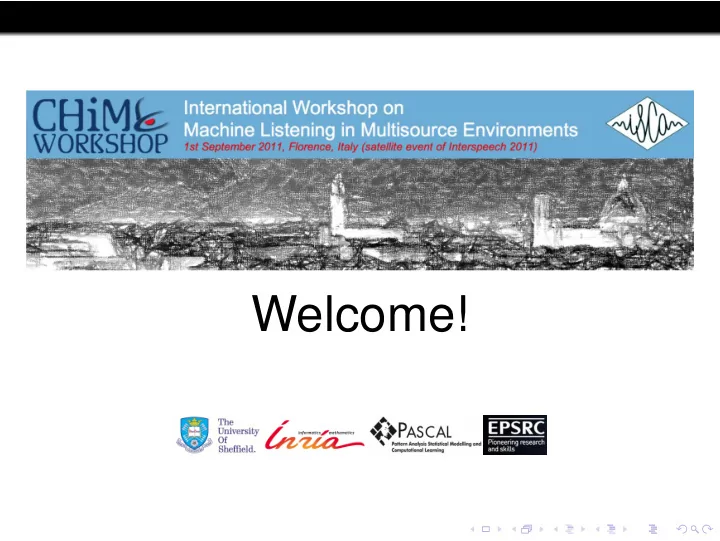

Welcome!
Workshop Motivation Machine Listening lacks a coherent community. Machine Listening researchers often identify themselves by specific application domains, for example, speech recognition people, music transcription and analysis people, acoustic event detection people, source separation people. Segregation emphasises the differences between these domains ... this impedes progress on shared problems. One particularly challenging problem is robustness in multisource environments. We hope this workshop can bring communities together to share important insights.
What is a ‘Multisource Environment’ ? By ‘multisource environment’ we are intending the following, Environments containing multiple sources of sound. The sound sources are typically individually localised in space. The activity level of the sources is changing over time. The sound sources may be static or moving. There may be some prior expectations, but many critical parameters are unknown (e.g. number of sources). Multisource conditions lead to challenging tasks, e.g., Recognising distant microphone speech in everyday settings. Transcribing a string quartet from a live recording. Detecting a specific bird call in a woodland recording. Enhancing a target speaker while suppressing multisource noise background.
The Challenge of Multisource Environments Multisource conditions are normal in everyday listening environments – and yet they are often treated as a special case. The human auditory system is highly adept at dealing with multisource conditions, Human ability has been much studied by the Hearing and Computational Hearing communities. But there is still no deep understanding of how the human ear really works. Computational models (e.g. CASA systems) remain a long way from human ability – a focus on toy problems. Historically, BSS and ASR communities have also focused on simple scenarios... but share a feeling that the time has come to address real-world problems. Real problems may demonstrate the need for significant re-design as simple systems no longer prove adequate.
Workshop Programme
Notes for Presenters Slides - please upload your slides onto the computer during the morning break. Timing - oral presentations should be 20 minutes with 5 minutes for questions and handover. Posters - please hang your poster during the morning break.
Special Issue of Computer Speech and Language Speech Separation and Recognition in Multisource Environments Important Dates November 30, 2011: Paper submission March 30, 2012: First review May 30, 2012: Revised submission July 30, 2012: Second review August 30, 2012: Camera-ready submission
CHiME Challenge and Workshop Questionnaire Feedback is essential for the sustainability of the challenge The Questionnaire You’ll find it in your packs. Please complete before 4.00 pm. No need to add name unless you wish! Place completed questionnaire in the box.
Acknowledgements Financial support: Organising Committee: Jon Barker, Dan Ellis, Phil Green, John Hershey, Walter Kellermann, Hiroshi Okuno, Emmanuel Vincent. Technical Committee: Heidi Christensen, Reinhold Häb-Umbach, Walter Kellermann, Ning Ma, Atsushi Nakamura, Francesco Nesta, Hiroshi Okuno, Alexey Ozerov, Armin Sehr. CHiME Challenge support: Ning Ma. Admin support: Gillian Callaghan (Sheffield), Constanza Vannocci (PLS Educational, Italy). Authors: 80 researchers contributing to today’s papers; Attendees: 68 delegates.
Recommend
More recommend